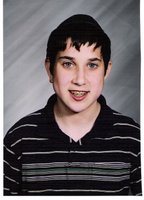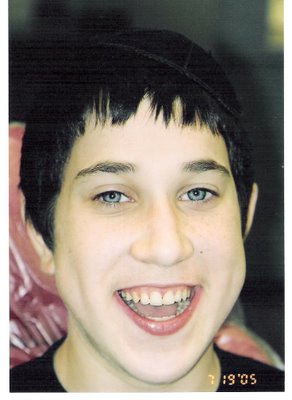To Avi on the Occasion of His Bar Mitzvah, From Me.
To Avi Lapidus on the occasion of his Bar Mitzvah:
Two verses in this morning’s sedra express my three wishes for you:
“Could we find a man like him, in whom is the spirit of God?”
“After God has made all this known to you...
...there is none as discerning and wise as you.”
Here are Pharaoh’s three descriptions of Yosef [Joseph]:
Ru'akh E-lohim - The “spirit of God,”
Navon - “discerning,” and
Ha-kham - “wise,”
are my three wishes for you. But what do these three qualities mean?
I turn to the comments of Rabbi Shmuel ben Meir, the Rashbam, one of Rashi’s grandsons. The Rashbam explains “spirit of God” to apply not only to Yosef’s ability to interpret dreams, but to something more important: the “wisdom of derekh eretz.” I understand Rashbam to mean “practical wisdom” or the “wisdom of the ways of the land.” He can also mean the “wisdom of proper manners or behavior.”
Avi, you don’t have to grow up knowing how to interpret dreams, but let those who are impressed with your synagogue skills, intelligence and sense of humor come to be impressed as well with your “wisdom of derekh eretz.” You’ve acquired a deep love of Judaism and mitzvot. The “wisdom of derekh eretz” requires you to share your Jewish knowledge with others humbly and respectfully.
My first wish for you, Avi:
When people see you with your kippah ["skullcap"] and tzitzit ["fringes": see Numbers 15:37-41], let them also see that you are a mensch, one with the “wisdom of derekh eretz,” one who is respectful to his parents, his teachers and his friends.
Rashbam explains the word navon, "discerning,” as understanding the future and seeing the consequences of one’s actions. Yosef understood his future, the future of his family, and the future of his adopted country, Egypt, when he planned years ahead for the seven years of famine, instead of simply living for the present.
My second wish for you, Avi, is for you to understand your future and to make good plans for it, just as Yosef did. Yosef did not get to fully enjoy adulthood until he was 30-years-old. On top of that, he had seven years to prepare for the coming famine. Hopefully, Avi, you won’t have to wait until you are thirty. Maybe the five short years between now and your 18th birthday seem like too long a time for you. But please use these years well. Your time in school, shul and home are preparation for your future. This leads to my third wish.
Rashbam describes Pharaoh’s third description of Yosef, Ha-kham - “wise” - as one who gathers wisdom from what he sees and hears.
Avi, you are lucky to remain surrounded by people from whom you can see good deeds and hear good lessons. You led services so well on Thursday morning, not because of a pre-bar mitzvah crash course of the type I used to give, but because you saw and heard your excellent teachers at the Solomon Schechter school and the Hebrew Academy. Even more important, you are a regular shul attendee, where you see the rituals and hear the melodies of prayer. We took pride in seeing you in your new tefillin and in hearing you lead services.
My third wish for you, Avi, is that you keep your eyes and ears open to the wisdom that the adults in your life - including Mom and I, Rabbi Adler, Rabbi Loiterman and your Jewish and secular studies teachers - want to impart to you. [Extemporaneous remarks followed.]
Two verses in this morning’s sedra express my three wishes for you:
“Could we find a man like him, in whom is the spirit of God?”
“After God has made all this known to you...
...there is none as discerning and wise as you.”
Here are Pharaoh’s three descriptions of Yosef [Joseph]:
Ru'akh E-lohim - The “spirit of God,”
Navon - “discerning,” and
Ha-kham - “wise,”
are my three wishes for you. But what do these three qualities mean?
I turn to the comments of Rabbi Shmuel ben Meir, the Rashbam, one of Rashi’s grandsons. The Rashbam explains “spirit of God” to apply not only to Yosef’s ability to interpret dreams, but to something more important: the “wisdom of derekh eretz.” I understand Rashbam to mean “practical wisdom” or the “wisdom of the ways of the land.” He can also mean the “wisdom of proper manners or behavior.”
Avi, you don’t have to grow up knowing how to interpret dreams, but let those who are impressed with your synagogue skills, intelligence and sense of humor come to be impressed as well with your “wisdom of derekh eretz.” You’ve acquired a deep love of Judaism and mitzvot. The “wisdom of derekh eretz” requires you to share your Jewish knowledge with others humbly and respectfully.
My first wish for you, Avi:
When people see you with your kippah ["skullcap"] and tzitzit ["fringes": see Numbers 15:37-41], let them also see that you are a mensch, one with the “wisdom of derekh eretz,” one who is respectful to his parents, his teachers and his friends.
Rashbam explains the word navon, "discerning,” as understanding the future and seeing the consequences of one’s actions. Yosef understood his future, the future of his family, and the future of his adopted country, Egypt, when he planned years ahead for the seven years of famine, instead of simply living for the present.
My second wish for you, Avi, is for you to understand your future and to make good plans for it, just as Yosef did. Yosef did not get to fully enjoy adulthood until he was 30-years-old. On top of that, he had seven years to prepare for the coming famine. Hopefully, Avi, you won’t have to wait until you are thirty. Maybe the five short years between now and your 18th birthday seem like too long a time for you. But please use these years well. Your time in school, shul and home are preparation for your future. This leads to my third wish.
Rashbam describes Pharaoh’s third description of Yosef, Ha-kham - “wise” - as one who gathers wisdom from what he sees and hears.
Avi, you are lucky to remain surrounded by people from whom you can see good deeds and hear good lessons. You led services so well on Thursday morning, not because of a pre-bar mitzvah crash course of the type I used to give, but because you saw and heard your excellent teachers at the Solomon Schechter school and the Hebrew Academy. Even more important, you are a regular shul attendee, where you see the rituals and hear the melodies of prayer. We took pride in seeing you in your new tefillin and in hearing you lead services.
My third wish for you, Avi, is that you keep your eyes and ears open to the wisdom that the adults in your life - including Mom and I, Rabbi Adler, Rabbi Loiterman and your Jewish and secular studies teachers - want to impart to you. [Extemporaneous remarks followed.]






0 Comments:
Post a Comment
<< Home